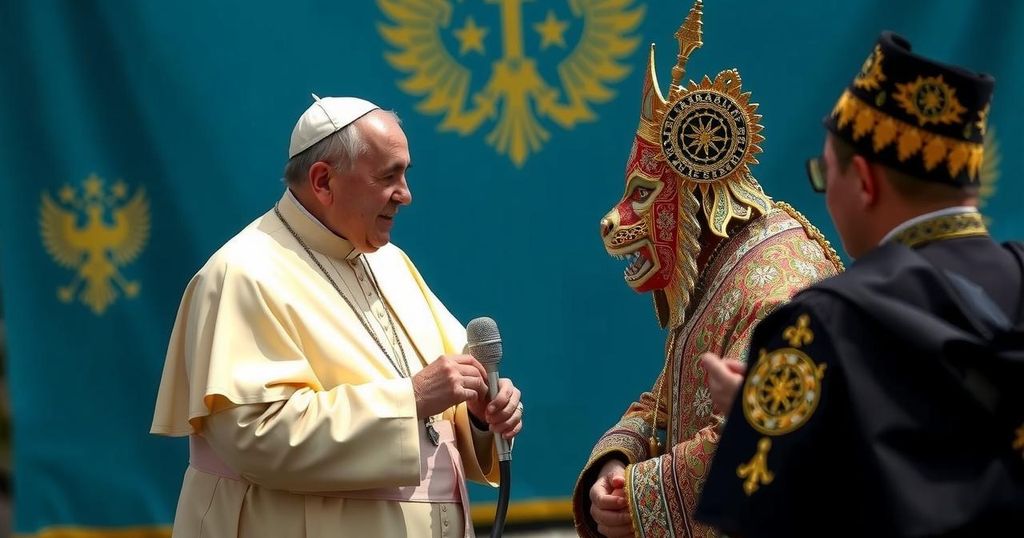Pope Francis’ call for interreligious dialogue has gained traction in Kazakhstan, demonstrated by a recent interreligious congress in Astana. The event gathered leaders from various faiths and illustrated Kazakhstan’s commitment to peace and collaboration amid global conflicts. Kazakhstan, with its diverse religious landscape and historical commitment to disarmament, represents a key partner for the Vatican in promoting interfaith dialogue and understanding. Overall, the relationship aims to foster a cooperative spirit among the world’s religions, addressing shared challenges through dialogue and youth engagement.
Pope Francis’ enduring advocacy for global solidarity and interreligious dialogue has found a notable ally in Kazakhstan, a predominantly Muslim nation in Central Asia. Throughout his papacy, he has emphasized the necessity for peace and fraternity across religions. A recent interreligious gathering on October 6 in Astana showcased Kazakhstan’s commitment to these principles, bringing together leaders from various faiths at the Palace of Peace and Reconciliation. This event marked the 22nd session of a congress inspired by the Catholic tradition and Pope John Paul II’s interreligious efforts, underlining a willingness for peaceful discourse despite global conflicts. The congress highlights Kazakhstan’s diverse religious landscape, which consists of 120 ethnic groups practicing 18 different religions, promoting a rich fabric of social harmony amid the influence of larger, regional powers. Kazakhstan has taken significant actions towards global peace, such as renouncing nuclear weapons in favor of diplomatic avenues, aligning with the Vatican’s vision. Pope Francis has engaged personally in this diplomatic arena, demonstrating the Vatican’s interest in fostering cooperative relations with Kazakhstan. However, challenges remain, including regulation on religious freedom under the country’s laws, which have drawn criticism despite allowing a vibrant religious community. Moving forward, leaders emphasized a shared commitment to active dialogue and spiritual diplomacy to confront global challenges, laying a foundation for interfaith collaboration that aims to equip younger generations to continue the work of peace and understanding.
The collaborative relationship between Kazakhstan and the Vatican continues to evolve, as the appointment of a new ambassador and the opening of a dedicated embassy in Rome are set to deepen these ties. Interreligious initiatives such as appointing goodwill ambassadors and fostering youth engagement through annual forums reflect a strategic commitment to dialogue over discord. The gathering on October 6 served as both a reflection on past achievements and a forward-looking vision, gathering religious leaders to commit to the principles outlined in Pope Francis’ encyclical, Fratelli Tutti, and extending the idea of coexistence as a pragmatic approach to global peace. Ultimately, Kazakhstan exemplifies a unique partnership with the Holy See, showcasing an ongoing commitment to dialogue and understanding among diverse faiths that has relevance far beyond its borders.
The article focuses on Pope Francis’ vigorous advocacy for interreligious dialogue and solidarity, notably embodied in his interactions and efforts with Kazakhstan. It highlights the historical context and significance of Kazakhstan’s engagement with the Vatican, specifically through its active participation in Congresses aimed at fostering peace among different religions. The region’s diverse religious landscape, alongside Kazakhstan’s notable international positions on nuclear disarmament and foreign policy, renders it a distinctive case study for understanding the practical implications of religious dialogue in increasingly complex geopolitical environments. The interaction between Pope Francis and Kazakhstan also sheds light on the broader aspirations of the Catholic Church in promoting cooperative engagement across faiths to address contemporary global crises.
In conclusion, the collaboration between Pope Francis and interfaith leaders in Kazakhstan underscores a robust and evolving commitment to promoting peace and solidarity in a tumultuous world. The recent gatherings and Kazakhstan’s strategic geopolitical positioning illustrate the potential for constructive dialogue among diverse religious communities. Despite challenges in governance affecting religious freedoms, there remains a palpable commitment to fostering an environment where interreligious dialogue can thrive, with a keen focus on nurturing future leaders who can further these ideals. As evidenced by Kazakhstan’s engagements with the Holy See, such partnerships are vital to confronting the pressing issues facing humanity today.
Original Source: www.ncregister.com






